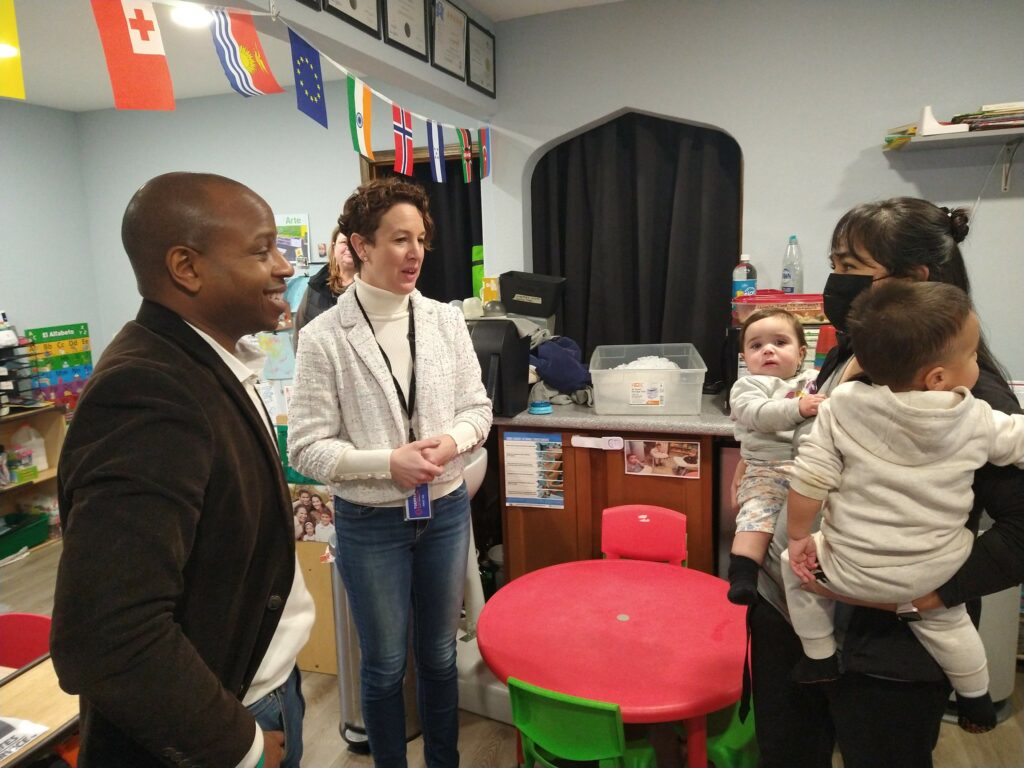City Offering $1,500 Grants To Early Childhood Workers
Funded by federal grant, effort is designed to grow the childcare workforce.

Mayor Cavalier Johnson (left,) Alderwoman Marina Dimitrijevic (center) and Yimma Davila-Castro (right) discuss early childhood education on Jan. 13 at a media event at Davila-Castro’s child care center, Yimma’s Bright Beginnings. Photo by Sam Woods/NNS.
If you work in early childhood education, you are likely eligible to receive a $1,500 stipend through the City of Milwaukee’s Early Childhood Workforce Stipend Program.
The program was developed by the Milwaukee Early Childhood Education Coalition, a group of industry partners working collectively to solve problems in the sector. It is meant to help early childhood educators stay in an industry that does not typically pay well. The program is facilitated by the Wisconsin Early Childhood Association and paid for using money from the American Rescue Plan Act, or ARPA.
The stipend program makes up the majority of a $7 million investment the City of Milwaukee has made to support early childhood educators using ARPA funding from the federal government. This funding comes in addition to $85 million in federal pandemic relief funding that the state of Wisconsin has granted to early childhood education providers since 2020 through the Child Care Counts program, some of which was passed on to child care staff.
Both sources of funding are temporary, with the city’s stipend program set to be paid out by the end of 2023 and the state’s Child Care Counts program set to expire in 2024.
Alderwoman Marina Dimitrijevic, who led the effort to include early childhood education funding in the city’s allocation of ARPA funding, said that although the benefit is temporary, it provides a blueprint for future investment.
“We hope this investment shows positive trends toward stabilizing this sector, and I’m excited the City of Milwaukee tried something new,” Dimitrijevic said. “We’re trying to fix a system that’s been broken for a while.”
Daria Hall, early childhood education director at the Greater Milwaukee Foundation and co-lead of the Milwaukee Early Childhood Education Coalition, also emphasized a desire to see more investment like this in the future.
“Milwaukee’s early educators make sure that parents can go to work, and that our youngest children are set up for success,” Hall said. “We believe that this is just the beginning of early childhood educators getting what they deserve.”
An investment in women of color
According to survey data from the Wisconsin Department of Children and Families collected from 2020-‘21, 99% of Milwaukee’s early childhood education workforce are women, and 61% identified as either Black (49%) or Hispanic (12%) in the survey.
Carmen Salinas began working at Yimma’s Bright Beginnings Daycare LLC, an early childhood education center on the far South Side, in November. She said that she loves the work and the children but believes the profession is more difficult than most people realize.
As a woman, caring for children is seen as something you just need to do, Salinas said. “But (early childhood education) is hard work, I mean immensely hard work. You have to be mentally able to handle the stress, and some people are just not ready for that.”
Salinas added that the low pay contributes to staff turnover, particularly with educators continually dropping out of the sector to pursue higher-paying, lower-stress jobs. This not only hurts child care business owners who have to constantly replace staff, but it hurts children because they lose the bond they shared with an educator when they leave.
However, Salinas and advocates such as Hall do not put the blame of low pay on employers, noting that the entire industry operates on razor-thin margins.
Data on how early childhood education providers spent money from Wisconsin’s Child Care Counts program since 2020 indicated that more than half of the providers in Milwaukee spent money they received on some form of pay raise for their employees. This data was last updated in September.
When Salinas receives the wage stipend, she said she will put the money toward food, bills and in her savings to prepare for a rainy day.
“As a single mom, I have to be ready for anything,” Salinas said.
For more information
For educators who are eligible, the stipend will be paid in three installments of $500 spread out over 2023. You can read more about eligibility requirements here and start an application here.
Early childhood educators can receive $1,500 from a new Milwaukee program was originally published by the Milwaukee Neighborhood News Service.
Political Contributions Tracker
Displaying political contributions between people mentioned in this story. Learn more.





















